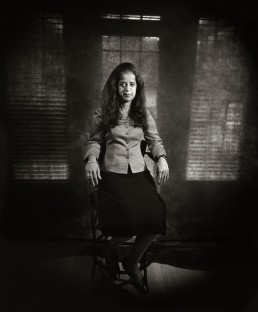S1: Episode 26 - Sandhya Rao

Episode Information
[Intro Music]
Narrator: Welcome to My Heart is Not Blind. Narrative histories about blindness and perception. A traveling exhibition and book published by Trinity University Press, supported by Kronkosky Charitable Foundation, edited and hosted by Michael Nye. Stories are often found, resting along the edges of surprise and revelation. Every person, every place is a map to somewhere else. Episode 26, Sandhya Rao.
Sandhya: Well, in India, in India, the disabilities are thought of as a curse from God. It’s a punishment for something that you may have done in a prior life. And my grandmother actually said that to me when I was 14 years old. She said, uh, she said, I feel sorry for her. Why did God do this to her? So for somebody to say, oh, this is a curse, uh, from God was just, uh, a really traumatic for me. And I remember responding by trying to run away in this mud village in South India where my dad grew up.
When I was two months old. Doctors diagnosed me with a brittle bone condition called osteopetrosis. And they told my parents that ultimately the condition would cause the loss of my vision. So I have no vision in my right eye and very marginal vision in my left eye. And also, I have brittle bones. So I have broken nearly every bone in my body. At least once I started learning to read braille when I was a child, I resisted very much. I was throwing books across the room. I was too cool to learn braille and my dad being the wise man that he is, he learned braille first, and he taught me, thank God he did . I would not have the education now if it weren’t for my dad. I read little women when I was like in fourth grade. And that story, you know, just the connection between those four sisters and how they led their lives, you know, simple and, you know, tried to be moral characters. I think that’s just morality. I mean, what do you have without morality? I mean, that’s your guiding, that should be your guiding principle.
I am physically weak because of my brittle bones, but emotionally and spiritually, I’m very strong. I have injured myself just getting out of the car. I broke my arm. My cat has jumped on me and broke my arm. I have broke my femur like three times before I was like 10. Then body cast for a lot of my childhood, I have broken the upper arm. I’ve broken my tibia, amphibia, I’ve broken the ulna radius on both arms. It’s, uh, it’s a challenge. Blindness is not ignorance. People try to attribute my extra sensory abilities to the fact that I’m blind and I don’t think I have any extra skills. I think I’ve just tried to pay attention more and use what I have. People think that because we do not see that we are somehow dumb or unaware, or ignorant of what the world is, and therefore, we need to protect you or we need to just get you out of the way because you’re just breathing air.
I have always been interested in writing and I love reading. So when I got accepted into Stanford Law School, my dad said that I want to help you with your career. And so he and my mother moved out to Palo Alto so that I could attend Stanford. And he took an early retirement from a career that he truly loved. So he and my mom, they took care of me. They drove me to class. My dad read for me, and, you know, did all that stuff so that I could pursue my education there. Four years ago, I got involved with a group and I have started to have more of a social life. Now we, you know, going to movies and restaurants and plays, and it’s been a new, a new experience for me.
My family was very protective, given my brittle bones in conjunction with the blindness. But they also know that I need to live my life and I’m, I’m a, a human and have to experience life. And so they’re willing to trust that I know what is safe for me, and I’ve been so very grateful to them for that. I am an attorney and I work for the United States District Courts for 20 years now. And in the course of my work, I deal with issues relating to the Fourth Amendment, which is illegal search and seizures, the Fifth Amendment, which is confessions. And then I also deal with the eighth amendment, the imposition of cruel and unusual punishment.
[Outro Music]
Host: Whenever I hear a sighted person speak of blindness, it’s always about inabilities or limitations. The conversations are rarely about competency are newfound perspectives. Sandhya takes competency and effort soaring. She said, “I have always considered myself an incredible, optimistic person and eager to learn and try new things. I’m not afraid to take risk.” She plays the piano and cares about notes and harmonies. She collects beautiful carved spoons from around the world. She believes that character comes from how one navigates struggle and difficulty. Her story is also the story about her family that is committed to supporting each other. It’s remarkable that Sandhya’s father, who is not blind, learned braille first and then taught brail to his daughter. Sandhya fell in love with reading languages, the history and meaning of words. She fell in love with the idea of learning. Join us next week. Two new episodes will be released. Please subscribe, rate, and review this podcast. You can also go to my website, michael nye.org/podcast. For portraits and transcripts. Thank you for listening.
